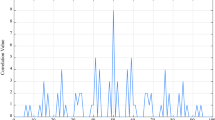Abstract
In this paper, we simulate the performance of phase modulation in coherent Optical Code Division Multiple Access (OCDMA) systems. An Optical Spreading Sequences, a Prime Code family named Double Padded Modified Prime Code (DPMPC) sequence has been generated and employed because of its flexible code length. The number of active users to be interacted is made high by increasing the Code length value. In this analysis, BPSK format has been deployed where phase modulation has been done with optical signal and Convolutional encoding has been done to the modulated wave for real time error correction and at the receiver side decoding has to be done by using Viterbi algorithm to minimize the bit errors of the output by estimating the original input bits and demodulation of the decoded bits has also done. The Bit error rate analysis is also investigated for this network.
Access this chapter
Tax calculation will be finalised at checkout
Purchases are for personal use only
Preview
Unable to display preview. Download preview PDF.
Similar content being viewed by others
References
Arasteh, D.: Teaching Convolutional Coding Using MATLAB in Communication Systems Course, in Dept of Electronic Engg tech., Southern University, Baton Rouge, LA70813, USA
Juleen, L., Kiong, T.S.: Dynamic (2, 1, 8) Convolutional Coding Algorithm for Data Correction and Security Enhancement in an Intelligent Urban Traffic Management System. J. ICGST-CNIR 5(3) (October 2006)
Liu, F., Karbassian, M.M., Ghafouri-Shiraz, H.: Novel family of prime codes for synchronous optical CDMA. Opt. Quant. Electron. 39, 79–90 (2007)
Massoud Karbassian, M., Ghafouri-Shiraz, H.: Study of Phase Modulations with Dual-Balanced Detection in Coherent Homodyne Optical CDMA Network. J. Lightw. Technol. 26(16) (August 15, 2008)
Karbassian, M.M., Ghafouri-Shiraz, H.: Fresh prime codes evaluation for synchronous PPM and OPPM signalling for optical CDMA networks. J. Lightw. Technol. 25, 1422–1430 (2007)
Karbassian, M.M., Ghafouri-Shiraz, H.: Capacity enhancement in synchronous optical overlapping PPM-CDMA network by a novel spreading code. In: Proc. GLOBECOM 2007, Washington, DC, November 26-30, pp. 2407–2411 (2007)
Karbassian, M.M., Ghafouri-Shiraz, H.: Performance analysis of Heterodyne detected coherent optical CDMA using a novel prime code family. J. Lightw. Technol. 25, 3028–3034 (2007)
Karbassian, M.M., Ghafouri-Shiraz, H.: Novel channel interference reduction in optical synchronous FSK-CDMA networks using a data free reference. J. Lightw. Technol. 26(8), 977–985 (2008)
Karbassian, M.M., Ghafouri-Shiraz, H.: Frequency-shift keying optical code-division multiple-access system with novel interference cancellation. Microw. Opt. Technol. Lett. 50(4), 883–885 (2008)
Karbassian, M.M., Ghafouri-Shiraz, H.: Phase-Modulations Analyses in Coherent Homodyne Optical CDMA Network Using a Novel Prime Code Family. In: Proc. The World Congress on Engg., WCE 2007, London, U.K., July 2-4, vol. 1 (2007)
Abtahi, M., Ayotte, S., Penon, J., Rusch, L.A.: Balanced Detection of Correlated Incoherent Signals: A Statistical Analysis of Intensity Noise With Experimental Validation. J. Lightw. Technol. 26(10) (May 15, 2008)
Esposito, R., Radicioni, D.P.: CarpeDiem: Optimizing the Viterbi Algorithm and Applications to Supervised Sequential Learning. J. Machine Learning Research 10, 1851–1880 (2009)
de Carvalho, V.R., de Almeida, C., Nisenbaum, E.: An Optical CDMA Network Using Incoherent Optical Processing and Bipolar Spreading Sequences
Kwong, W.C., Perrier, P.A., Prucnal, P.R.: Performance comparison of asynchronous and synchronous code-division multiple- access techniques for fiber-optical local area networks. IEEE Trans. Commun. 39, 1625–1634 (1991)
Wang, X., Wada, N., Cincotti, G., Miyazaki, T., Kitayama, K.: Demonstration of 12-user, 10.71 Gbps truly asynchronous OCDMA using FEC and a pair of multi-port optical-encoder/encoders. In: Proc. ECOC 2005, Glasgow, U.K. (2005), postdeadline paper Thu 4.5.3
Painchaud, Y., Poulin, M., Morin, M., Têtu, M.: Performance of balanced detection in a coherent receiver, TeraXion inc., 2716 Einstein Street, Québec, Qc, G1P 4S8, Canada
Author information
Authors and Affiliations
Editor information
Editors and Affiliations
Rights and permissions
Copyright information
© 2012 Springer-Verlag Berlin Heidelberg
About this paper
Cite this paper
T., H.V., S., P., S.A., S. (2012). BPSK Phase Modulation with Novel Prime Codes in OCDMA Networks. In: Krishna, P.V., Babu, M.R., Ariwa, E. (eds) Global Trends in Computing and Communication Systems. ObCom 2011. Communications in Computer and Information Science, vol 269. Springer, Berlin, Heidelberg. https://doi.org/10.1007/978-3-642-29219-4_59
Download citation
DOI: https://doi.org/10.1007/978-3-642-29219-4_59
Publisher Name: Springer, Berlin, Heidelberg
Print ISBN: 978-3-642-29218-7
Online ISBN: 978-3-642-29219-4
eBook Packages: Computer ScienceComputer Science (R0)




